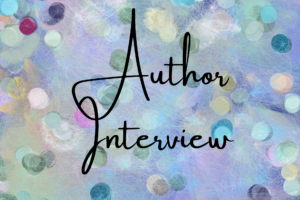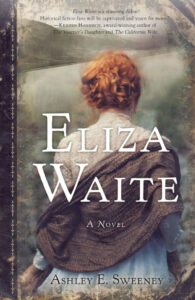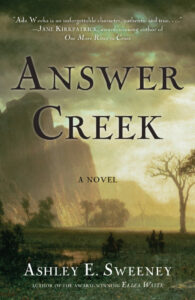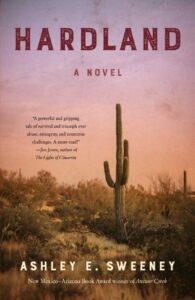Telling Untold Stories: An Interview with Ashley E. Sweeney
 Like many of the authors who participate in this series, Ashley E. Sweeney features strong female protagonists in her work. These women, set in various countries and periods in time, all showcase intelligence, determination, and resilience, making for engaging characters and award-winning narratives. Readers and reviewers alike praise Ashley’s “meticulous” research and “skillfully rendered” stories, and her most recent novel, The Irish Girl, was featured in BookBub’s “The Best Historical Fiction of Winter 2024” list. If you’re a historical fiction fan, be sure to check out all of Ashley’s novels!
Like many of the authors who participate in this series, Ashley E. Sweeney features strong female protagonists in her work. These women, set in various countries and periods in time, all showcase intelligence, determination, and resilience, making for engaging characters and award-winning narratives. Readers and reviewers alike praise Ashley’s “meticulous” research and “skillfully rendered” stories, and her most recent novel, The Irish Girl, was featured in BookBub’s “The Best Historical Fiction of Winter 2024” list. If you’re a historical fiction fan, be sure to check out all of Ashley’s novels!
Welcome, Ashley.
Christina: The Irish Girl released last December. How is it different from what came before? How is it similar?
Ashley: Nothing in my writing life prior to The Irish Girl prepared me for the transformative aspects of penning this novel. Yes, I sat at the same desk, kept the same hours, gazed at the same view, and referred to the same books of writing craft. I wrote the requisite four drafts, sent to beta readers, and edited liberally. On paper, the process of writing this novel mirrored the path that guided my first three novels. But writing this novel, based loosely on my great-grandmother Mary Agnes Coyne’s story of coming from rural Ireland to America alone in 1886 at age thirteen, changed me in deep and life-changing ways.
As an author devoted to historical accuracy, I contend there is no substitute for standing on the ground where a novel takes place. Imagine my sensory overload—physically, mentally, emotionally, spiritually—standing on the plot of ground where my great-grandmother grew up at Dawros Beg, a peninsula outside Letterfrack, Connemara, County Galway and contemplating writing her story. My very own great-grandmother, not a fictional heroine. Sent away. Alone. It was mind-blowing.
In western Ireland, my husband Michael and I rented an authentic nineteenth century cottage perched on a bluff overlooking the Atlantic outside of nearby Tully Cross to experience rural Irish living. While there, a tropical storm blew in. The howling wind! The driving rain! The dampness that settled in our bones! We drank tea with whiskey and huddled under blankets in front of a peat fire, not unlike my ancestors would have done. I could literally feel their presence. And to top it off, the storm was named “Agnes.” A coincidence? I think not.
In addition to bringing a heightened level to my writing, the whole Irish experience led me back to the Catholic Church, which I had been away from for decades.
My husband presciently said I wrote the novel, but the novel rewrote me.
Christina: As you said, the book is based on the story of your paternal great-grandmother. Did you ever consider writing a nonfiction account of her story? How and why did fiction win out?
Ashley: I chose long ago to pursue fiction, so I never considered writing a nonfiction account of Mary Agnes Coyne’s life. It would have been impossible to do so, even if I had chosen that avenue, as I had little to go on other than snippets of family lore. The Irish as a whole were illiterate until the twentieth century, and all that remained of Mary Agnes’s life were a birth and baptismal certificate, a few letters written and photos taken in her later life, and a death certificate.
In the end, fiction was the only pathway if I chose to write Mary Agnes’ story. Saying that, three-quarters of the novel is true to time and place, although I gave her an alternative ending, which I mention in the afterword, for reasons of my own.
Christina: The opening of the book sinks us right into the Irish setting of Galway’s docks, brimming with damp and dark mud, cut only by Mary Agnes’ red hair and green sweater. How important is setting to each of your books, and how do you manage to nail the details?
Ashley: In all of my novels, setting can be classified as a character, so yes, setting is paramount in my novels. I write cinematographically, that is, I “watch” the characters in their settings in my head as I write, so it must all be fleshed out, down to the finest detail, cufflinks, moss, phase of the moon. Because I was a poet first, before turning to journalism and later fiction writing, I bring an extrasensory aspect to my writing. Speaking of, hearing Irish actress Aoife McMahon narrate the novel enhances the experience; to hear a native Irish speaker bring the words to life is thrilling. The roll of her r’s, the inflection and timbre of her voice—it is all wonderful.
Christina: Your website describes you as a “writer of untold women’s stories.” In my opinion, the word “untold” can have multiple meanings. Why did you choose that word in particular?
Ashley: Because I insert fictional protagonists into my stories (with a fictionalized version of my great-grandmother in this novel), all the stories they tell are by definition “untold.” As observers of history, my protagonists comment on all facets of the world in which they live.
Creating the world my characters inhabit is multi-faceted, and it includes details such as dress, footwear, vagaries of speech, music, politics, culture, transportation, hygienic habits, and food, for starters. Researching all these aspects fascinates me and often leads to many days “down the rabbit hole.”
At the heart of all my novels is the plight of women at different periods in history, and how these women fared exercising their agency, often against unpromising odds. I can’t promise all details and endings are saccharine, either; I tell it like it was, warts and all. But they all triumph over something or someone, sometimes in small, and sometimes in large ways.
Christina: I was intrigued by the questions you ask as you write (as mentioned on your website). One of those is, “What can my characters do to bridge differences between diametrically opposed factions?” That’s a great question, and one that we should consider every day in our own lives. Do you have any suggestions for how we can do this in our day-to-day interactions?
Ashley: This is an especially difficult task in the current political climate. As a news junkie, I am tempering my news watching with other pursuits and am working on staying sane and focused on my writing at this time. And praying to become a better version of myself every day.
Christina: You’re a part of the Women’s Fiction Writers Association. How long have you been a part of it? What does this organization mean to you?
Ashley: WFWA is one of several groups to which I belong, and I find the organization as a whole, and the historical fiction cohort especially, to be a great support. I also belong to Women Writing the West, Western Writers of America, Historical Novel Society, and Pacific Northwest Writers Association.
Christina: Your work is award winning. How do those awards factor into your definition of literary success?
Ashley: Nothing prepares an author for post-publication life. I always thought a writer’s life would be romantic—sitting all day at a desk pouring words onto the page. I have learned there are many facets to book publishing, including much time preparing tip sheets, cover art memos, editing, editing, editing (did I mention editing?!), publicity, marketing, applying for grants and fellowships, attending conferences, going on speaking tours, and chasing awards.
I’d be lying if I said awards don’t matter. I’ve popped champagne winning awards and cried being left off prestigious award lists. As a judge for several national writing contests, I know how subjective book award contests can be. For a book to rise to the top of the slush pile, it usually has to pass through two to three stages of judges, all of whom use precise rubrics to measure “success.”
I’m humbled that my novels have won or placed in eighteen writing contests. It’s affirmation from within the industry. Full stop. But readers’ notes and emails and comments are the cherry on top of the sundae. That a reader took the time to borrow or buy my book, spend hours immersed in my story, and then write to me—that is the very best affirmation an author can get.
Christina: Gardening is an interest of yours, and your garden is beautiful. Does the practice fulfill a similar creative void as writing does? Which comes more easily to you? What is your favorite flower?
Ashley: As I get older, spring is more and more precious. Today, on a drizzly fifty-degree Pacific Northwest day, my garden is fallow, with the exception of a few brave shoots that defy weather and logic to spring forth. This new life never fails to amaze me, even though I’ve been gardening constantly, and arduously, since my 20s.
I’m blessed with multiple gardens around my modest Cape Cod cottage here in this northwest corner of Washington, and I tend to them lovingly all summer long. It is joy unparalleled to dig in the dirt, weed, water, prune. And then sit back at the close of day and admire the beauty. I also enjoy art quilting and singing, other avenues for my creative output. But writing is my first love.
P.S. Picking a favorite flower is like trying to pick a favorite child or a favorite book. How to choose between the fluffy layering of a peony, the tights whorls of a rose, the Broadway show-stopping dahlia, the tiny tendrils of clematis?
Christina: What’s next for you?
Ashley: I’m deep into my fifth novel, set in 1930s Tucson at an elite prep school for girls, and my first stab at multiple points of view, so it’s keeping me on my toes. I hope to finish by the end of the year and will seek representation after that. And I have four other contenders, nagging at the edge of my psyche: Pick me! Pick me! These include a dual narrative set in Astoria, Oregon in 1814 and 2014, a WWII novel set on Cape Cod, a Nebraska farm novel, and my first novel, still unpublished, which I don’t know if I’ll ever dare it see the light of day, set in contemporary Maine.
Ashley can be found in multiple places!
Website: https://ashleysweeneyauthor.com/
Instagram: @ashleysweeneyauthor
Contact: contact@ashleysweeneyauthor.com
Thanks to Ashley for agreeing to this interview! Feel to leave a comment!




